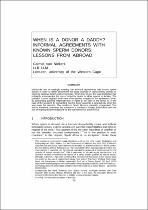| dc.contributor.author | van Niekerk, Carmel | |
| dc.date.accessioned | 2022-05-03T07:46:40Z | |
| dc.date.available | 2022-05-03T07:46:40Z | |
| dc.date.issued | 2021 | |
| dc.identifier.citation | Van Niekerk, Carmel ‘When is a donor a daddy? Informal agreements with known sperm donors: Lessons from abroad’ Obiter 42:1 (2021) pp. 70–83 | en_US |
| dc.identifier.issn | 2709-555X | |
| dc.identifier.uri | http://www.scielo.org.za/scielo.php?script=sci_arttext&pid=S1682-58532021000100005 | |
| dc.identifier.uri | http://hdl.handle.net/10566/7336 | |
| dc.description.abstract | Individuals are increasingly entering into informal agreements with known sperm donors in order to either circumvent the costs involved in using fertility centres or owing to personal beliefs and preferences. When they do so, the legal protection that ordinarily accompanies the use of a fertility centre is either sparse or lacking. The question is what happens when one of the parties reneges on the agreement, either by demanding parental responsibilities or rights in the case of the donor or, in the case of the recipient, by demanding that the donor assumes a parental role when this was never his intention. The position in South Africa is currently unregulated. This article, therefore, examines the position in a number of foreign jurisdictions with the aim of making recommendations for the way forward in South Africa. | en_US |
| dc.language.iso | en | en_US |
| dc.publisher | Nelson Mandela University | en_US |
| dc.subject | Sperm donors | en_US |
| dc.subject | Fertility centre | en_US |
| dc.subject | South Africa | en_US |
| dc.subject | National Health Act | en_US |
| dc.title | When is a donor a daddy? Informal agreements with known sperm donors: Lessons from abroad | en_US |
| dc.type | Article | en_US |

